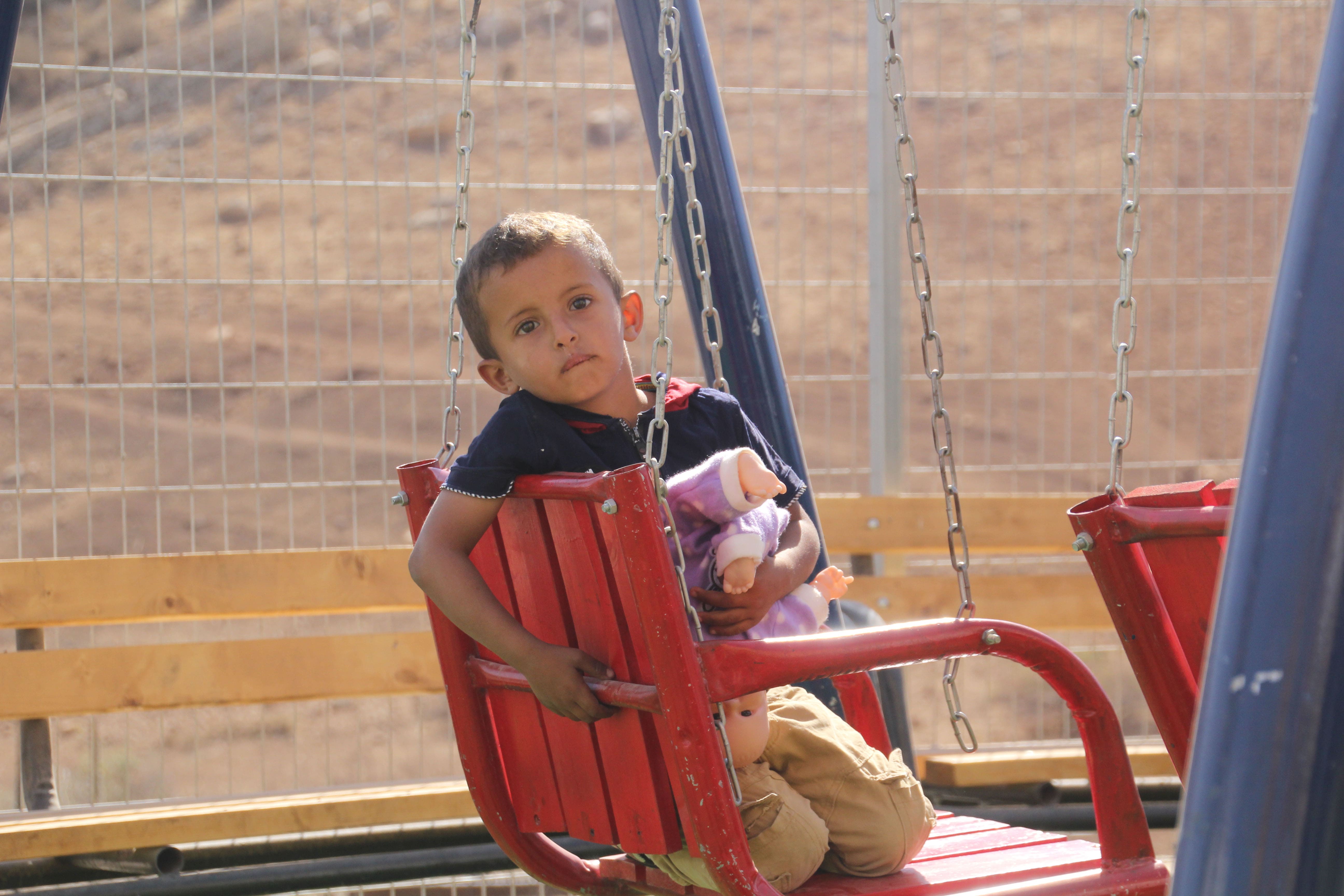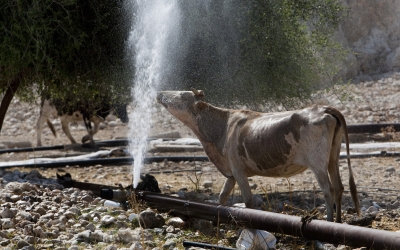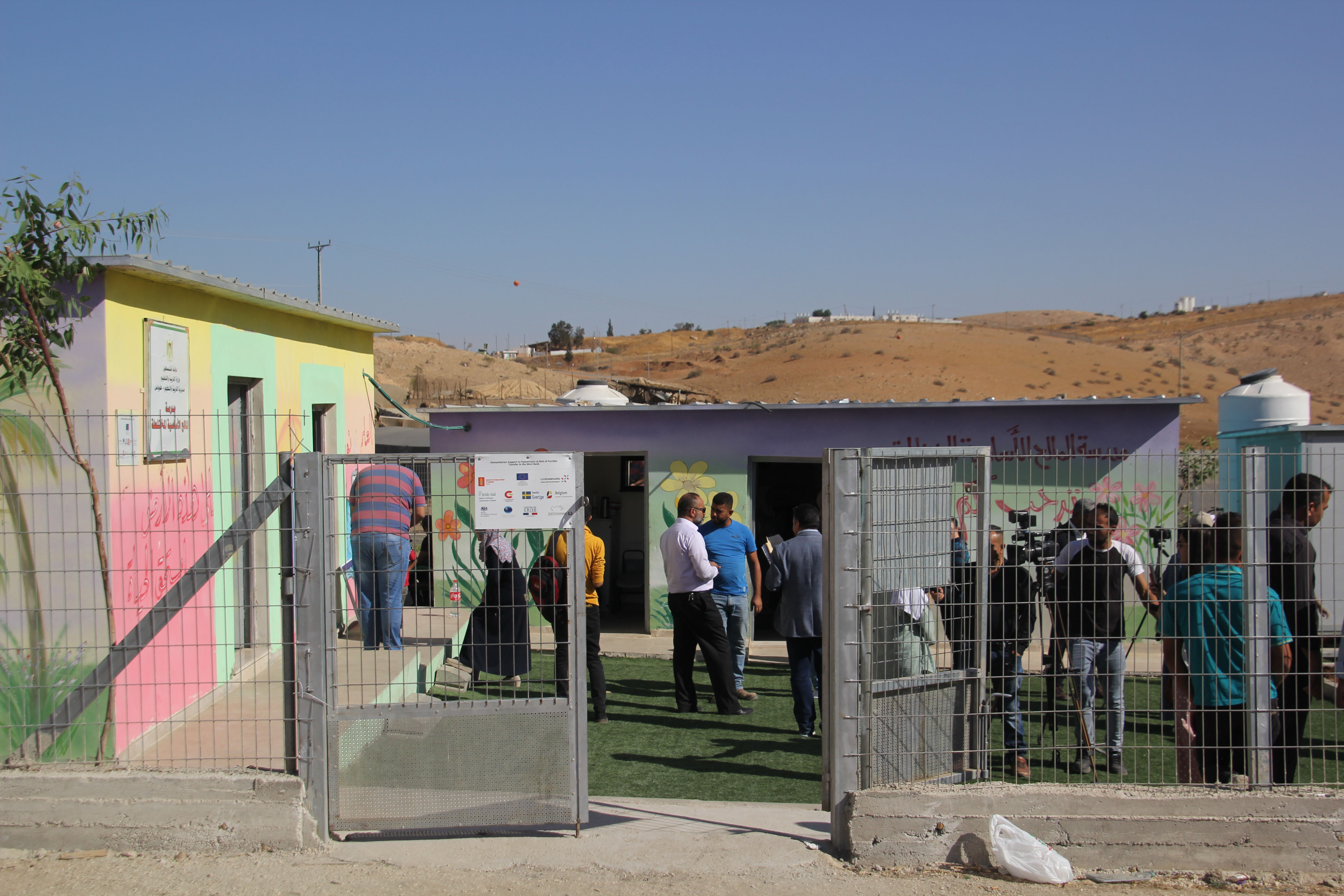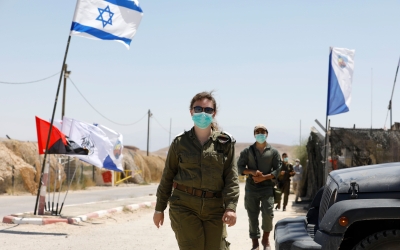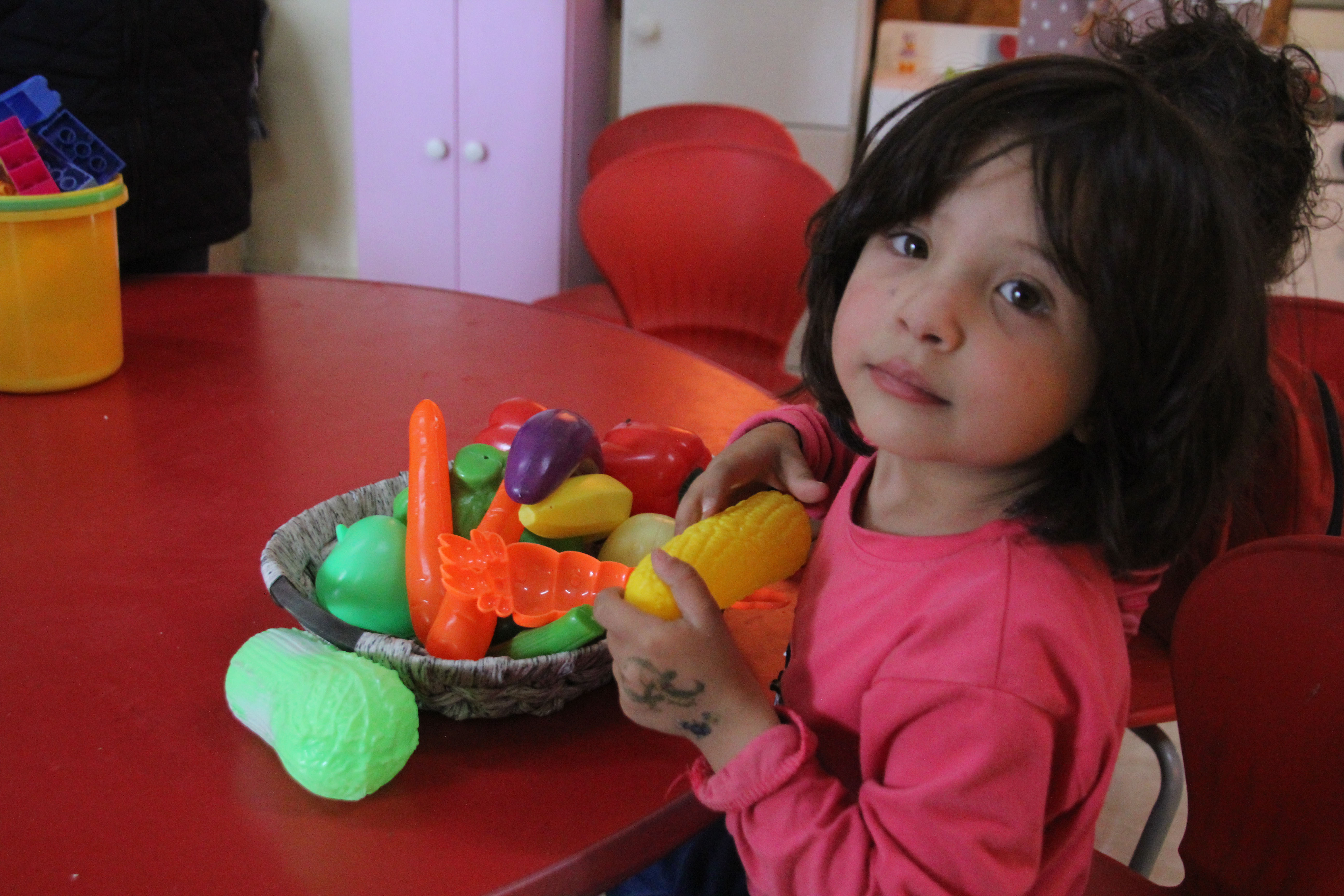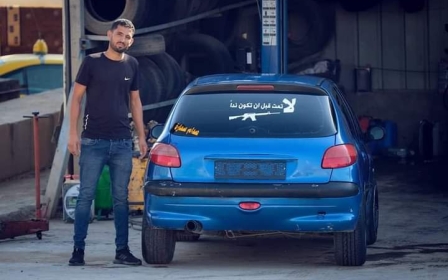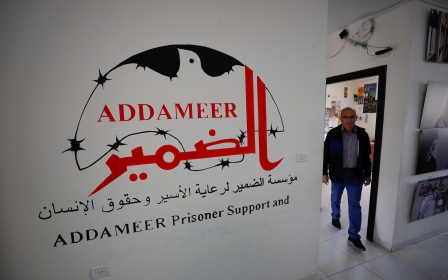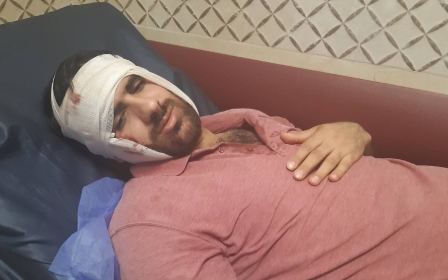Jordan Valley: Kindergartens facing Israeli threats give vulnerable communities hope
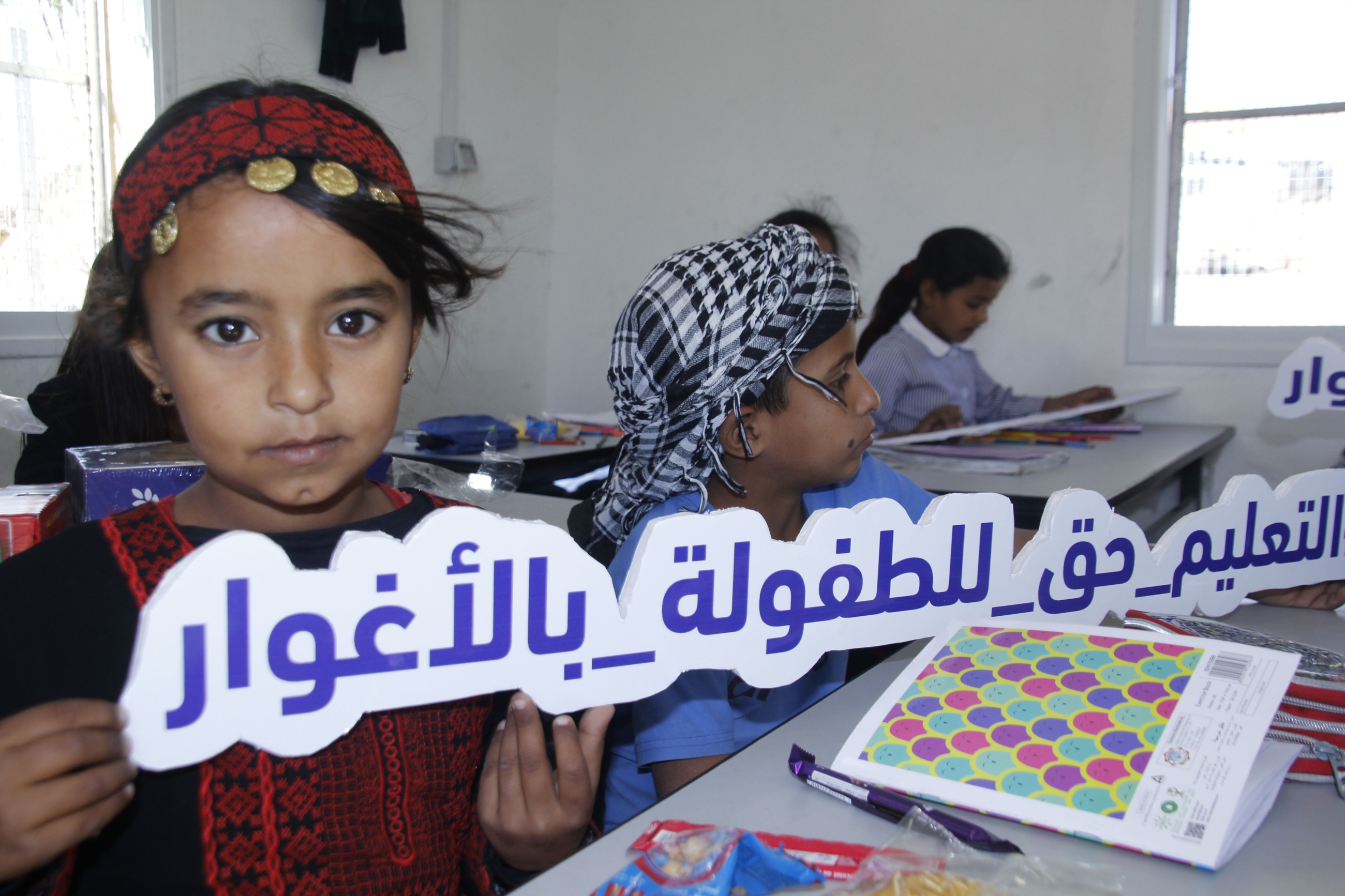
On securely built modern swing sets, made of hard plastic and metal, Yaqeen and his classmates were playing in their break on a sunny autumn day, before going back to class to continue learning the Arabic alphabet and solving maths problems in their school in the occupied Jordan Valley.
Five-year-old Yaqeen is grateful to be a student at al-Maleh Kindergarten, built to serve five Bedouin communities in northern Jordan Valley in occupied Palestine.
He told Middle East Eye that he had mastered the Arabic alphabet and some basic math through playing and learning at his kindergarten, which he attends daily thanks to its proximity to his home.
For Yaqeen and his classmates, Mohamed and Salman, attending pre-school is the best preparation for elementary school, safeguarding their right to education and reducing their chances of dropping out of their schools in the future.
New MEE newsletter: Jerusalem Dispatch
Sign up to get the latest insights and analysis on Israel-Palestine, alongside Turkey Unpacked and other MEE newsletters
However, in the absence of safe and well-equipped buses, there are six other children who are deprived of attending the kindergarten because their homes are several miles away, schoolteacher Asmaa Ghannam told MEE.
Al-Maleh Kindergarten is part of a development project set up more than a year ago by a number of civil society organisations in cooperation with the Palestinian Ministry of Education to bolster early childhood education.
The project has recently launched a campaign entitled "Education is a right for Jordan Valley children", which seeks to support local education as a means of empowering children and their families to resist attempts to evict them from their lands.
"It is painful when children can't show up to school because of the obstacles they would face on their way," Ghannam says. "But I am proud of even one child's attendance, because it's an achievement and a challenge for the Israeli occupation."
More than a year ago, Ghannam started work as a kindergarten teacher in Al-Maleh area. At the time, the children attended classes inside a tent. They were always vulnerable to reptiles, insects and rodents, she said.
However, she believes that Israeli occupation is the biggest threat to the children.
"The real danger to children is the Israeli occupation soldiers and the Jewish settlers who threaten the kindergarten with demolition," Ghannam said.
Annexation fears
In addition to the kindergarten, Israeli authorities have notified the "Tahaddi 21" School, known as al-Maleh School, of imminent demolition on the pretext of being built in Area C, in which Israel has complete control, the school principal Jaafar Foqaha told MEE.
The school is part of a chain built by the Palestinian government in marginalised and Bedouin areas to support their perseverance against occupation.
Foqaha said the real motivation for the harassment faced by Jordan Valley residents is Israel's plan to drive away the Palestinians in order to annex their lands.
According to Foqaha, the occupation has followed through with its threats. Two months ago, Israeli authorities razed to the ground two new classrooms belonging to the brick and tin-built school as well as a metal shade that protected children from the heat of summer and rain of winter. It also confiscated its construction equipment.
Israeli authorities also summoned Foqaha and interrogated him for five hours in Binyamina police headquarters in Jerusalem. He was then placed under house arrest and was prevented from having access to the school and the area for ten days.
Foqaha said the campaign and relevant civil society pressure to support local education has made him more hopeful that there would be school buses to transport children to the kindergarten.
The role of the bus is not confined to transportation, he said, but would also protect the children from settlers and the Israeli army, which has one of its seven Jordan Valley military bases meters away from al-Maleh, along with 37 Jewish settlements for 11,000 settlers.
There are now 16 kindergartens in the northern, central, and southern Jordan Valley, thanks to the early childhood education project.
Ahmed Abu al-Heija, the head of the advisory board of the government team tasked with implementing the kindergarten project, said the aim of the project is to provide education to this category of children within their areas of residence, thus decreasing their dropout rates and preventing their migration with their families in search of education. This, in turn, would protect the land from settler expansion, and will strengthen the residents' links to their land, he explained.
The "Education is a right for Jordan Valley children" campaign, according to Abu al-Heija, is a continuation of the kindergarten project, which is planned to extend to 30 other sites that need such kindergartens.
Meanwhile, the Taawon Welfare Association, a sponsor of the project, aims at raising the awareness of families on the importance of education for their kids, says Anwar Abu Ammash, projects director at the association.
Abu Ammash believes that awareness is as important as renovating kindergartens, training educators and administrators and providing educational resources such as toys, books and computers.
He added that his association works with other entities and official institutions in particular to promote children's right to education and convince their families of the value of that right in the light of the large number of those deprived of educaton in Bedouin encampments.
According to a fact sheet from the government-appointed team implementing the kindergarten project, 600 children are deprived of their right to education in Bedouin communities in the Jordan Valley. The high cost of transportation of children to their schools has contributed to that number.
The fact sheet also showed a gender gap that prevents girls from accessing early and later stages of education, due to the lack of local education services in many Bedouin communities and the difficulty of transportation to distant locations.
Challenging occupation
Israa al-Debs, a teacher at Badw al-Kaabneh school in the central Jordan Valley, commutes every day for 70 kilometres from her home in Bethlehem to reach her work.
Out of six of her students, only four showed up on Monday. But that was not frustrating for al-Debs, who still thinks "attendance of one child is in itself a victory".
'The kindergarten is the only hope for families who want to avoid delaying their children's education till the age of seven to join first grade'
- Abdallah Kaabneh, teacher
"They come to learn despite the threat of the Israeli occupation soldiers and their military drills along the way. They have seen and experienced more than once the expulsion of their families and demolition of their homes," she told MEE.
Al-Kaabneh school was built in the 1950s, pre-dating Israeli occupation of the area.
Abdallah Kaabneh, father of one student and a teacher at the school, said it has received 21 notices of demolition so far from Israeli authorities, which also threaten to demolish the kindergarten attached to the school and its playground, which were built a year ago.
"The kindergarten is the only hope for families who want to avoid delaying their children's education till the age of seven to join first grade," he added.
"Now after opening the kindergarten, the children join school at the age of four and five and then continue to elementary school at age six," he explained.
Suwar Nujoom, a four-year-old pupil, says that she is luckier than other children because her home is close to the kindergarten. Her classmates have to come on foot or ride donkeys, in the best cases, to get to the school.
'Localising education'
On the pretext of its classification as Area C, the Israeli occupation bars the Palestinians from building in the Jordan Valley.
Since 1967, the area has been under the Israeli army's control, and with the signing of Oslo Accords in 1993, 87 percent of the land has been classified as Area C, administered by Israel.
The Israeli practices and gross violations of the rights of Palestinians, by arresting them and demolishing their agricultural and housing structures, have led to the reduction of the Palestinian population of the Jordan Valley from 320,000 in 1967 to only 56,000 in 2020.
'There is a continuous war waged by the occupation to depopulate and confiscate the land- but the Palestinians will continue to reject it'
- Walid Assaf, Palestinian minister
According to Walid Assaf, head of the Colonisation and Wall Resistance Commission, the Israeli occupation is not only preventing building or licensing Palestinian enterprises, but it is also demolishing the existing structures in the context of a plan to drive the population out of the valley.
As an official Palestinian Authority agency, Assaf tells MEE that the plan of his commission is to rebuild what the occupation has demolished, and then provide essential services like education to the people.
"We have started with building the Tahaddi schools. So far we have built 22 of them, and later we contributed to the building and development and equipping of 16 kindergartens."
Through building of schools and kindergartens in the Jordan Valley, Assaf seeks to "localise education". In other words, the plan is to deliver education services to these Bedouin encampments to "promote their steadfastness in their lands" and stand against demolition, which has so far knocked down 600 buildings.
Of these, around 50 percent were in the Jordan Valley, 40 percent in the West Bank, and 10 percent in East Jerusalem, he said.
Assaf vows to immediately rebuild any school or kindergarten demolished by the occupation.
"There is a continuous war waged by the occupation to depopulate and confiscate the land - but the Palestinians will continue to reject it."
Middle East Eye delivers independent and unrivalled coverage and analysis of the Middle East, North Africa and beyond. To learn more about republishing this content and the associated fees, please fill out this form. More about MEE can be found here.


